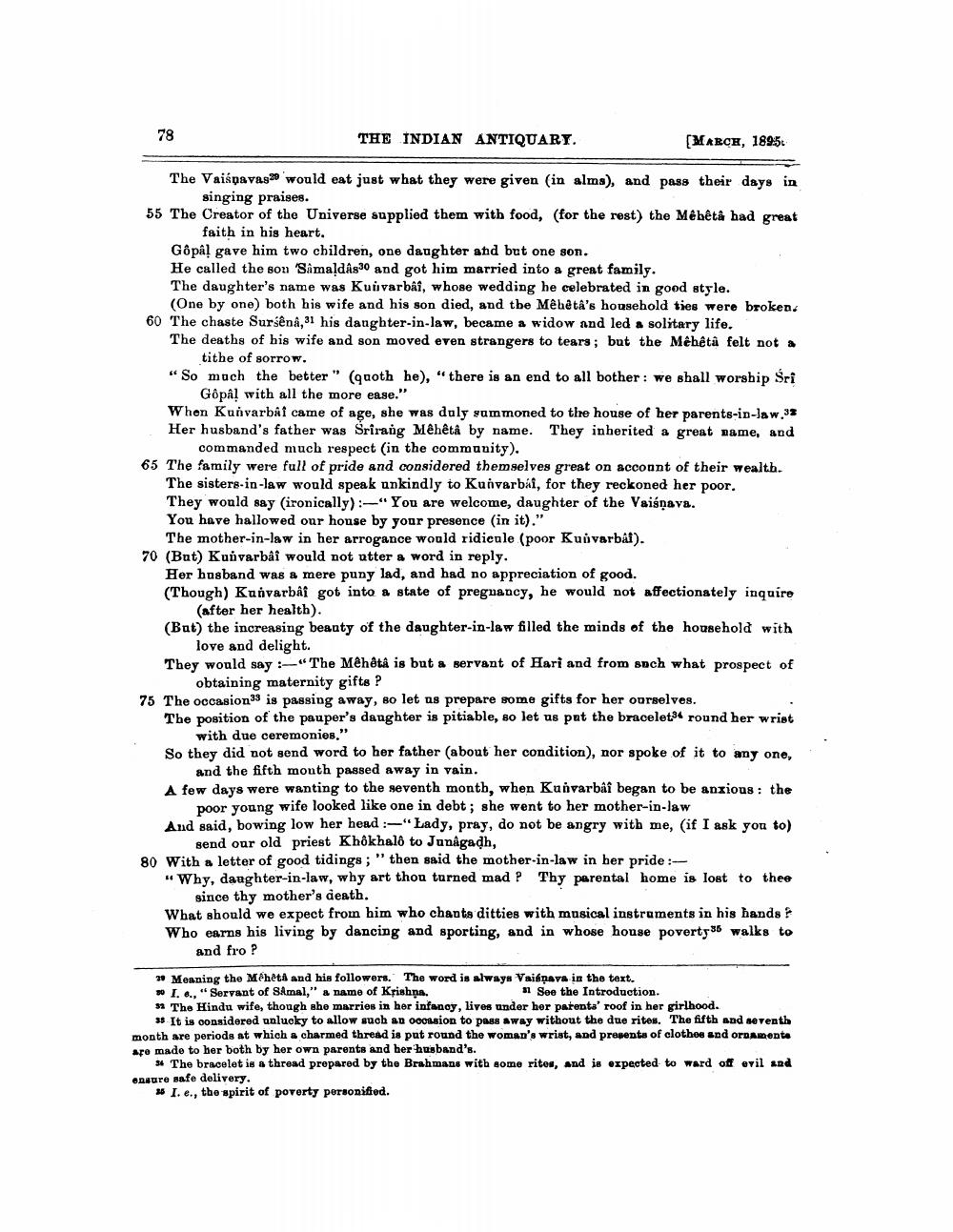________________
THE INDIAN ANTIQUARY.
[MARCH, 1895
The Vaispavag2 would eat just what they were given (in alms), and pass their days in
singing praises. 55 The Creator of the Universe supplied them with food, (for the rest) the Mēbêtâ had great
faith in his heart. Gôpå! gave him two children, one daughter and but one son. He called the son 'Simaldas30 and got him married into a great family. The daughter's name was Kuivarbâi, whose wedding he celebrated in good style.
(One by one) both his wife and his son died, and tbe Mêbêtâ's household ties were broken. 60 The chaste Suršêná, 31 his daughter-in-law, became a widow and led a solitary life. The deaths of his wife and son moved even strangers to tears; but the Mêbêtå felt not a
tithe of sorrow. "So much the better" (quoth he), "there is an end to all bother: we shall worship Sri
Gopal with all the more ease." When Kunvarbâi came of age, she was duly summoned to the house of her parents-in-law.33 Her husband's father was Srirang Mêhêtå by name. They inherited a great name, and
commanded much respect (in the community). 65 The family were full of pride and considered themselves great on account of their wealth.
The sisters-in-law would speak unkindly to Kunverbái, for they reckoned her poor. They would say ironically):"You are welcome, daughter of the Vaisnava. You have hallowed our house by your presence in it)."
The mother-in-law in her arrogance would ridicule (poor Kuóvarbat). 70 (But) Kunvarbâi would not atter a word in reply.
Her husband was a mere puny lad, and had no appreciation of good. (Though) Kunvarbâi got into a state of pregnancy, he would not affectionately inquire
(after her health). (Bat) the increasing beauty of the daughter-in-law filled the minds of the household with
love and delight. They would say :-" The Mêhêtâ is but a servant of Hari and from spch what prospect of
obtaining maternity gifts ? 75 The occasion is passing away, so let us prepare some gifts for her ourselves. The position of the pauper's daughter is pitiable, so let us put the bracelet84 round her wrist
with due ceremonies." So they did not send word to her father (about her condition), nor spoke of it to any one,
and the fifth month passed away in vain. A few days were wanting to the seventh month, when Kunvarbai began to be anxious: the
poor young wife looked like one in debt; she went to her mother-in-law And said, bowing low her head :-"Lady, pray, do not be angry with me, (if I ask you to)
send our old priest Khôkhalo to Junagadh, 80 With a letter of good tidings; "then said the mother-in-law in her pride :-- " Why, daughter-in-law, why art thou turned mad? Thy parental home is lost to thee
since thy mother's death. What should we expect from him who chants ditties with musical instruments in his hands ? Who earns his living by dancing and sporting, and in whose house poverty 36 walks to
and fro ?
* Meaning the Mêheti and his followers. The word is always Vaikneva in the text. » I.., "Servant of Samal," a name of Krishna
See the Introduction. 51 The Hindu wife, though she marries in her infanoy, lives under her parents' roof in her girlhood.
38 It is considered unlucky to allow such an occasion to pass away without the due rites. The fifth and seventh month are periods at which a charmed thread is put round the woman's wrist, and prepents of clothes and ornamento are made to her both by her own parents and her husband's.
34 The bracelet is a thread prepared by the Brahmans with some rites, and is expected to ward off evil and ensure safe delivery.
I. e., the spirit of poverty personified.




